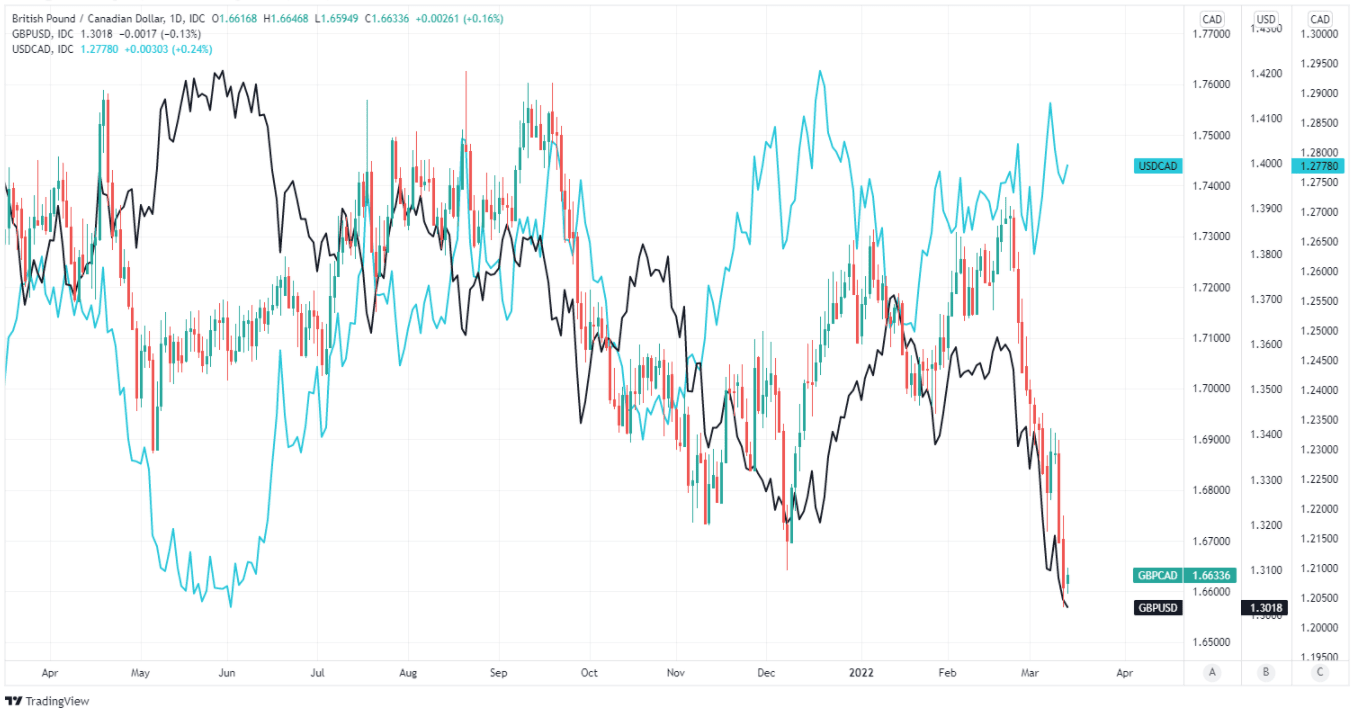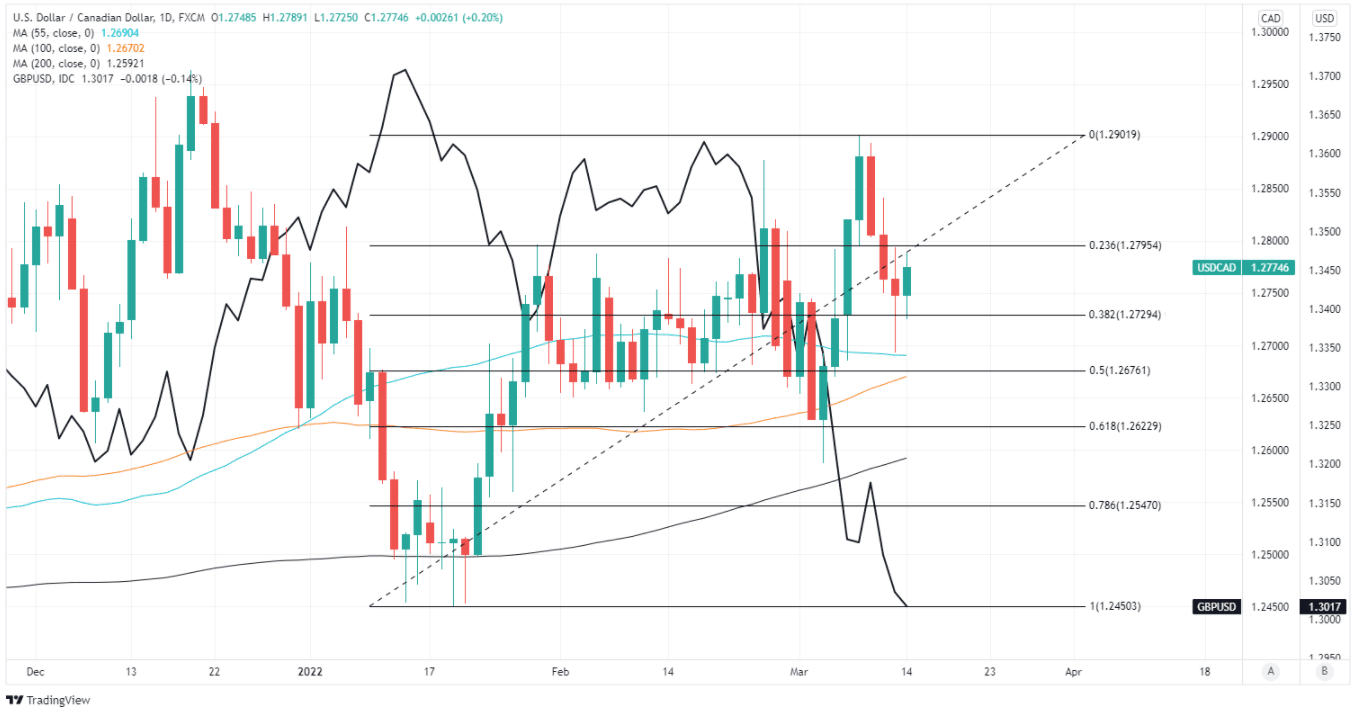Pound / Canadian Dollar Week Ahead Forecast: Vulnerable and Risking Probe Below 1.65
- Written by: James Skinner
- GBP/CAD could struggle to recover above 1.67
- Could languish sub-1.67 & risks dip below 1.65
- CA’s CPI data poses downside risk for GBP/CAD
- Likewise with BoE’s monetary policy statement

Image © Adobe Stock
The Pound to Canadian Dollar exchange rate booked a third consecutive weekly decline last Friday but remains at risk of further losses that could ultimately see it trading briefly beneath the 1.65 handle over the coming days, which would leave Sterling at its lowest since late 2019.
GBP/CAD fell heavily last week after the main Sterling exchange rate GBP/USD extended its March decline with a hat-trick of intraday losses, although the downward lurch in USD/CAD during the latter half of last week also weighed heavily on the Pound-Canadian Dollar rate.
The Canadian Dollar pushed USD/CAD lower and notably so in the wake of Friday’s blowout jobs report for February but it could add further weight around the ankles of GBP/CAD this week if Wednesday’s inflation figures stoke further demand for the Loonie.
“Feb jobs data underscores the fact that the Canadian economy is off to a strong start in Q1,” says Shaun Osborne, chief FX strategist at Scotiabank.
“With inflation expected to push higher next week (no consensus is available yet but global trends suggest a decent move higher from Jan’s 5.1%), the pressure for tighter monetary policy is clear. A more aggressive posture on monetary policy would bolster the CAD which would give the BoC a further edge in its battle to curb prices,” Osborne also said in a Friday research note.
Above: Pound to Canadian Dollar rate shown at daily intervals, alongside GBP/USD and USD/CAD.
- Reference rates at publication:
GBP to CAD spot: 1.6650 - High street bank rates (indicative): 1.6067 - 1.6184
- Payment specialist rates (indicative: 1.6500 - 1.6530
- Find out about specialist rates and service, here
- Set up an exchange rate alert, here
Canada’s labour market has more-than recovered its pandemic-inspired job losses but continued to grow at a strong pace in February and this could encourage the Bank of Canada (BoC) to feel more comfortable lifting its interest rate further during the months ahead.
“Another acceleration in Canada’s inflation will reinforce the need for a material increase in the Bank of Canada’s policy interest rate," says Joseph Capurso, head of international economics at Commonwealth Bank of Australia.
Canadian inflation has continued to rise over recent months and any further increase in the February data released on Wednesday would only bolster the case for the BoC to push ahead with the “series” of interest rate rises that it has repeatedly suggested is likely ahead.
This could all mean there’s a risk of further simultaneous declines in USD/CAD and GBP/USD that would again weigh heavily on GBP/CAD later this week, given that Thursday’s Bank Bank of England (BoE) policy decision is also a possible downside risk for Sterling on this occasion.
{wbamp-hide start}
{wbamp-hide end}{wbamp-show start}{wbamp-show end}
“The rates markets are expecting the BoE to deliver another 25bp hike. That said, we expect the minutes of the March policy meeting to strike a much more cautious tone on the economic outlook compared to February in view of the impact from the Ukraine crisis,” says Alexandre Dolci, an FX strategist at Credit Agricole CIB.
“The latest CPI data risk evidencing that the Canadian economy is also facing stronger inflationary pressures and the BoC expected the headline CPI to stall just above 5% this quarter. If so, this could strengthen the case for the BoC to deliver two back-to-back rate hikes in Q222 and a relatively fast rebuilding of the CAD carry appeal could give a boost to the currency,” Dolci also said on Friday.
GBP/CAD tends to closely reflect the relative performance of Sterling and the Loonie when each is measured against the U.S. greenback, and with few exceptions; simultaneous declines in GBP/USD and USD/CAD tend to be accompanied by aggressive losses for GBP/CAD and vice versa.
The Pound to Canadian Dollar rate would slip briefly below 1.65 this week if Wednesday’s inflation data keeps USD/CAD under pressure around or below the 1.28 handle and if at the same time, Thursday’s BoE decision nudges GBP/USD beneath 1.30 and toward 1.29 or below.
Above: USD/CAD shown at daily intervals with Fibonacci retracements of late January rally indicating possible areas of technical support for USD.
Secure a retail exchange rate that is between 3-5% stronger than offered by leading banks, learn more.
There are reasons for why GBP/USD could be likely to extend its nascent decline and not least the significant build-up of market expectations for Bank Rate later this year, which potentially risk being disappointed by the details of the BoE’s monetary policy statement on Thursday.
“I was just going to repeat the words that we used in the monetary policy statement, which is that further modest tightening is likely to be appropriate in the coming months. That’s the position,” Governor Andrew Bailey told the Treasury Select Committee in a late February parliamentary hearing.
“I said in the press conference when we issued the report, and I would just repeat those words. You know, it is a message to markets not to get carried away and I mean, it’s the same message that Dave Ramsden gave in his speech yesterday,” the Governor added.
Market-implied expectations for the BoE’s Bank Rate at year-end have risen further from 1.80% to 1.99% since February 23 and seemingly in response to the Russian invasion of Ukraine on February 24, which prompted steep and highly inflationary increases in energy prices.
But it’s a long way obvious that BoE policymakers share the market’s view that a shift to an outright ‘tight’ stance of monetary policy is likely to be necessary in the months ahead as a result of that.
"It's not clear at this stage if those recent developments have any effects on the outlook for inflation two and three years out," Monetary Policy Committee member Michael Saunders was quoted saying at the University of East Anglia on March 01.







